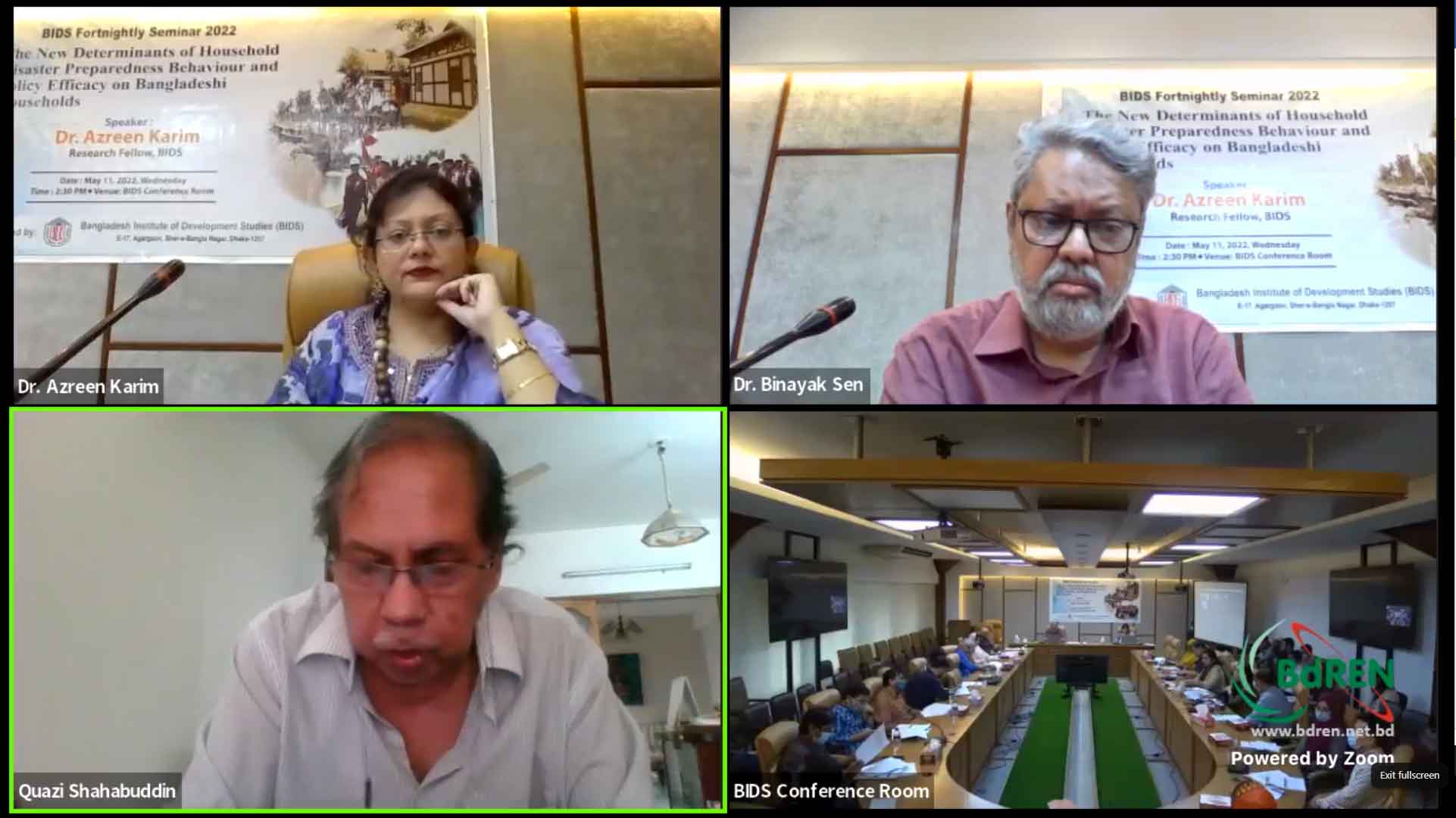
The new determinants of household disaster preparedness behaviour and Policy efficacy on bangladeshi households
Bangladesh Institute of Development Studies (BIDS) organized a seminar on May 21, 2022 titled “The New Determinants of Household Disaster Preparedness Behaviour and Policy Efficacy on Bangladeshi Households”. Dr. Azreen Karim, Research Fellow, BIDS presented her research at this seminar. The seminar was held in a hybrid mode.
In her research, Dr. Azreen showed that; in Bangladesh, disaster risk perception explains around 1.46% of formal education with nearly 7.39% of female education compared to the mean. Similarly, climate change perception accounts for around 1.51% of formal education, whereas education levels of female household heads explain almost 7.68% compared to the mean, indicating the overwhelming importance of enhanced disaster education (formal and non-formal) for women in climate and disaster risk reduction policies in Bangladesh. She argues that mainstreaming disaster education across education, climate change and disaster risk reduction policies could significantly enhance responsiveness to our disaster preparedness behaviour and thereby increase household resilience.
Dr. Karim found that household responses to adoption of numerous forms of preparedness measures ranges between 2% and 3.6% due to increase in remittances while ranging between 1.4% and 2.4% increase due to percentage increase in residing in better housing (i.e., resilient infrastructure). She also found that access to safe drinking water, electricity and sanitation also influences preparedness behaviour significantly. Her findings further show that social capital is a robust determinant of adoption of preparedness measures; disaster displacement as an important determinant of disaster preparedness behaviour of households; displaced people are found to be better prepared due to their past disaster experience and actively respond to the government interventions and policies; wealth and salaried income are positively and significantly associated with disaster preparedness compared to net per capita income and daily wages. Per capita income (net) is found to have a negative relationship (but insignificant) along with daily wages, which is also not found to be strongly correlated with disaster preparedness behaviour.
Karim’s contribution to the “climate-development” literature is three-fold: first, she argues that in the absence of a globally agreed loss and damage framework, this study conceptualizes disaster preparedness as a risk reduction pathway towards sustainable development. Second, she provides strong empirical evidence to what extent disaster preparedness could reduce household loss and damage arising from 12 types of natural disasters among 143,980 households across 64 disaster affected regions (including agro-ecological zones) of Bangladesh using big data for the first time in this study. Third, she strongly argues that integration of development and disaster risk reduction policies could further reduce the amount of losses arising from climate-induced natural disasters, implying integrated impacts across various SDG targets at the micro-household level. Her findings suggest that disaster preparedness is almost 76% effective in mitigating net income loss (per capita) and nearly 81% effective in mitigating salaried income loss (annual) arise via unemployment channel (i.e., loss of employment days due to climate disasters) at the household level. However, demand-side policies are found not so effective in loss mitigation via production emphasizing government’s various support package interventions. She also strongly argues that integration of development and preparedness policies could further reduce the amount of climate losses implying integrated impacts across various SDG targets. She therefore recommends that short-term and disaster-specific “72-hour early warning-based preparedness education program” and/or “3-5-day flood forecasting model-based preparedness education program” as potential solutions that requires further research.
BIDS researchers, development practitioners and journalists attended the seminar. The seminar was chaired by Dr. Binayak Sen.
